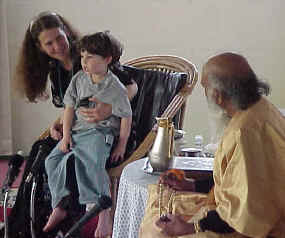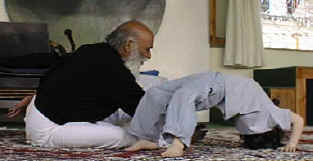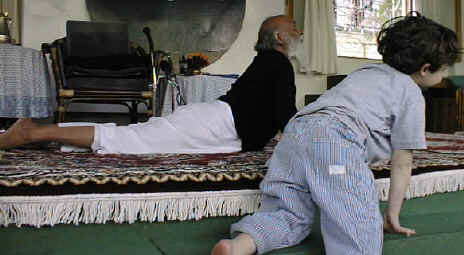Constant Repetition, Constant Education
 Repetition: the key to learning
Repetition: the key to learning
Through learning words, through the repetition of words, and through the understanding of the meanings of words, we as human beings build knowledge.
There are two things at work here: the knowledge of forms and the knowledge of words and their meanings. The knowledge of the form 'flower' is not the same as the knowledge of the word, 'flower'. Even a very young child knows a flower, but it takes him or her some time to learn the word 'flower.'
In the same way, a child can see an elephant figure. And he can hear the word 'elephant.' But unless the child associates the word with the elephant figure, he will not know the meaning of the word.
This knowledge of words and their meanings does not come about without repetition. Repetition is constant education. So, the child has to repeat. He or she needs to be in the constant flow of education.
And so it is with the knowledge of God.
But if you repeat 'You are Self, You are Self,' you will never come to know that 'I am Self' because you keep saying 'You are Self.' (Laughter.)
Knowledge is gained when you know 'I am that Self'Gyaan (knowledge of the Self) is not grasped through words. Suppose I say 'You are God.' You hear the words. But you do not grasp that you are that.
In the same way, if I say, 'You are immortal and blissful,' you may hear the words, but you still do not grasp the knowledge of them.
Human beings are confused because the knowledge that they are God has not been received. Once you have become crystallized and confused, it is hard for anyone to get you unconfused. How many times have you heard the words 'I am immortal' and yet still haven't grasped them?
Knowledge of the Self is gained only when you know 'I am that Self.'
The Knowledge of Consciousness
If you keep repeating (Swami-ji points to his thumb), 'This is thumb, this is thumb,' the knowledge that the word 'thumb' means the form 'thumb' will eventually come. Through this kind of repetition, you have all built up your knowledge of things and forms.
But then one day, someone introduces to you the word 'consciousness.' And you try to grasp its meaning. Since your knowledge up to this point is is only of things and forms, you have no other choice but to imagine that consciousness arises from these things and forms.
No one tells you that consciousness is first. No one tells you that consciousness is the source of all things and forms. No one tells you the meaining of 'Om, Om Om.' Why? Because you cannot make a form out of the word 'Om', like you can out of the word 'elephant' or 'mouse.' So how will you ever get the meaning of the word 'Om?'
The teacher feels incompetent in trying to communicate this knowledge. It will certainly not be gained after one or two tries. Jap (repetition) is needed. Constant repetition is needed to know that 'I am the whole.'
Attention on forms or attention on light?
On a TV set, you see the images and the forms on the screen, but you do not see the light out of which they are made. Why? Because your attention is on the things and forms, the moving images.
Now here, look around you. You also see things and forms. But consciousness you don't see.
Western philosophers are telling us that consciousness arises out of the body and mind. But you are made of light. And that light is consciousness. And that consciousness, because it knows matter, is not different from matter.
The power of meditation
Suppose now that you repeat the words 'I am immortal,' for half an hour.
During this period of meditation, no one is counting the things and forms. That much advantage there is in meditation! (Laughter.)
In meditation, for that half hour at least, your Knower is not identified with things and forms. So meditation counteracts the constant interaction of the Knower with things and forms. Without meditation, you will have the knowledge of things and forms, but not the knowledge of consciousness. So in meditation, we develop the knowledge that you, as the one who is the Knower of things and forms, never change.
In that state, you can grasp consciousness. But it takes practice.
Now close your eyes.
When you close your eyes, you come to know the nature of consciousness.
Swami-ji demonstrates his love of children - and some yoga techniques at the same time - with Isaac.


- 13 April 1999
Copyright © 1999-2005 International
Meditation Institute. All Rights Reserved